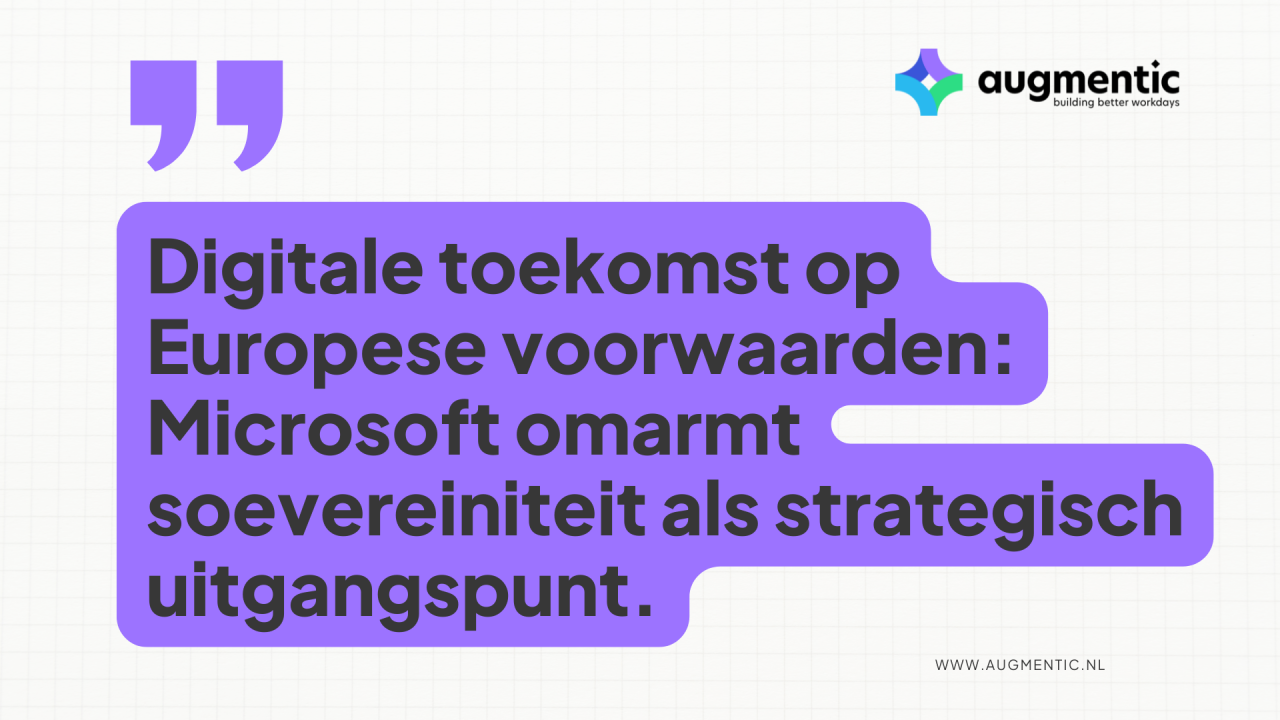Augmentic BV
Haaswijkweg east 12B
3319 GC Dordrecht
The Netherlands
Augmentic BV
Haaswijkweg east 12B
3319 GC Dordrecht
The Netherlands

Microsoft announced five commitments to strengthen Europe's digital autonomy in Brussels on April 30, 2025. These include expanding data centers, strengthening digital sovereignty, enhanced data protection, local cybersecurity measures and investing in digital skills. The goal is to align technology with European values and regulations.

Today, April 30, 2025, in Brussels, Microsoft announces a series of new commitments to the European market. Not just a set of promises, but a strategic and politically charged statement that recalibrates the relationship between big tech and European values. At a time when digital sovereignty, transparency and trusted AI applications are at the top of the agenda, Microsoft is choosing a course that puts Europe at the center.
Microsoft President Brad Smith's message is clear: Europe is not just an outlet, but a full partner in shaping the digital future. Microsoft presents five concrete commitments that respond not only to regulation, but also to social and geopolitical tensions. The core: more digital infrastructure, more control for European governments, and more protection for users.

Microsoft announces a major expansion of its European data center infrastructure. Capacity will grow by 40% over the next two years, with operations in 16 countries. By 2027, the network will consist of more than 200 data centers across the continent.
This move increases the local availability of advanced technologies such as AI and strengthens the digital autonomy of European organizations. Less reliance on intercontinental data processing means not only faster performance, but also an easier route to local regulatory compliance.
Microsoft is strongly positioning itself as a defender of European control over its own data and infrastructure. Attempts by foreign governments to intervene in European cloud operations will be legally challenged. Moreover, this will be laid down in contracts with governments.
An EU-only governance structure for Europe's data centers underscores this direction. This shifts power over digital infrastructure closer to European soil - a development that directly strengthens the strategic autonomy of public and private organizations.
The promise to store and process European customer data exclusively within Europe is not new, but is now backed up more concretely with better encryption, tighter access controls and greater transparency over data flows.
In practice, this means more certainty when designing and deploying digital solutions. Especially organizations that work with sensitive information - or are highly regulated - will gain a more reliable foundation under their digital ambitions.
With a new Deputy CISO for Europe and additional investments in the implementation of the EU Cyber Resilience Act, Microsoft is sending a clear signal: cybersecurity will no longer be managed centrally from the U.S., but will be anchored locally. Think faster reporting of vulnerabilities, better support for open source security and sharper follow-up of incidents.
This approach aligns well with the broader push for secure, agile technology ecosystems. At a time when AI solutions are automating more and more tasks, strong digital resilience is essential.
Microsoft has stated its ambition to train over 2.5 million Europeans in digital skills by 2027. At the same time, open source initiatives and regional innovations will be promoted through targeted investments and collaborations.
That combination - skills and accessibility - creates a stronger breeding ground for digital innovation within Europe. It makes it easier to connect new technology to practical applications that meet local needs.
This new direction from Microsoft is more than a response to regulation; it is a recalibration of the relationship between technology, governance and trust. For organizations seeking greater control, transparency and trust in their digital strategy, it creates tangible benefits.
With infrastructure within Europe, clear legal frameworks and a growing range of locally anchored services, the barrier to deploying innovative, data-driven solutions is lower than ever. Especially for those looking to invest in AI, automation or digital transformation without compromising on security or control.